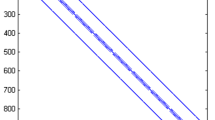Abstract
Partial differential equations (PDEs) are important mathematical models, which are used to model complex dynamic systems in applied sciences. For example, PDEs are used to model flexible beams and ropes [1, 2], crowd dynamics [3, 4], or fluid dynamics [5, 6]. However, PDEs are infinite-dimensional systems, making them hard to solve in closed form, and computationally demanding to solve numerically. For instance, when using finite element methods (FEM), one may end up with a very large discretization space, which incurs large computation times. Because of this complexity, it is often hard to use PDEs to analyze, predict, or control these systems in real time.
Access this chapter
Tax calculation will be finalised at checkout
Purchases are for personal use only
Similar content being viewed by others
References
Montseny, G., Audounet, J., Matignon, D.: Fractional integro-differential boundary control of the Euler–Bernoulli beam. In: IEEE, Conference on Decision and Control, San Diego, California, pp. 4973–4978 (1997)
Benosman, M.: Lyapunov-based control of the sway dynamics for elevator ropes. IEEE Trans. Control Syst. Technol. 22(5), 1855–1863 (2014)
Huges, R.: The flow of human crowds. Annu. Rev. Fluid Mech. 35, 169–182 (2003)
Colombo, R.M., Rosini, M.D.: Pedestrian flows and non-classical shocks. Math. Methods Appl. Sci. 28(13), 1553–1567 (2005)
Cordier, L., Noack, B., Tissot, G., Lehnasch, G., Delville, J., Balajewicz, M., Daviller, G., Niven, R.K.: Identification strategies for model-based control. Exp. Fluids 54(1580), 1–21 (2013)
Balajewicz, M., Dowell, E., Noack, B.: Low-dimensional modelling of high-Reynolds-number shear flows incorporating constraints from the Navier-Stokes equation. J. Fluid Mech. 729(1), 285–308 (2013)
Holmes, P., Lumley, J.L., Berkooz, G.: Turbulence, Coherent Structures, Dynamical Systems and Symmetry. Cambridge University Press, Cambridge (1998)
Couplet, M., Basdevant, C., Sagaut, P.: Calibrated reduced-order POD-Galerkin system for fluid flow modelling. J. Comput. Phys. 207(1), 192–220 (2005)
Kalb, V.L., Deane, A.E.: An intrinsic stabilization scheme for proper orthogonal decomposition based low-dimensional models. Phys. Fluids 19(5), 054106 (2007)
Bui-Thanh, T., Willcox, K., Ghattas, O., van Bloemen Waanders B.: Goal-oriented, model-constrained optimization for reduction of large-scale systems. J. Comput. Phys. 224(2), 880–896 (2007)
Ilak, M., Bagheri, S., Brandt, L., Rowley, C.W., Henningson, D.S.: Model reduction of the nonlinear complex Ginzburg-Landau equation. SIAM J. Appl. Dyn. Syst. 9(4), 1284–1302 (2010)
Kalashnikova, I., van Bloemen Waanders, B., Arunajatesan, S., Barone, M.: Stabilization of projection-based reduced order models for linear time-invariant systems via optimization-based eigenvalue reassignment. Comput. Methods Appl. Mech. Eng. 272, 251–270 (2014)
Wang, Z., Akhtar, I., Borggaard, J., Iliescu, T.: Proper orthogonal decomposition closure models for turbulent flows: a numerical comparison. Comput. Methods Appl. Mech. Eng. 237–240, 10–26 (2012)
San, O., Iliescu, T.: Proper orthogonal decomposition closure models for fluid flows: Burgers equation. Int. J. Numer. Anal. Model. 1(1), 1–18 (2013)
San, O., Borggaard, J.: Basis selection and closure for POD models of convection dominated Boussinesq flows. In: 21st International Symposium on Mathematical Theory of Networks and Systems, pp. 132–139. Groningen, The Netherlands (2014)
Benosman, M., Kramer, B., Boufounos, P.T., Grover, P.: Learning-based reduced order model stabilization for partial differential equations: application to the coupled Burgers’ equation. In: American Control Conference, pp. 1673–1678 (2016)
Benosman, M., Borggaard, J., San, O., Kramer, B.: Learning-based robust stabilization for reduced-order models of 2D and 3D Boussinesq equations. Appl. Math. Model. 49, 162–181 (2016)
Benosman, M.: Learning-Based Adaptive Control: An Extremum Seeking Approach - Theory and Applications. Elsevier Ed., Butterworth-Heinemann, Oxford (2016)
Balajewicz, M.: Lyapunov stable Galerkin models of post-transient incompressible flows. Technical report (2013). arXiv:1312.0284
Gunzburger, M.: Finite Element Methods for Viscous Incompressible Flows. Academic, Cambridge (1989)
Kunisch, K., Volkwein, S.: Galerkin proper orthogonal decomposition methods for a general equation in fluid dynamics. SIAM J. Numer. Anal. 40(2), 492–515 (2007)
Kramer, B., Grover, P., Boufounos, P., Nabi, S., Benosman, M.: Sparse sensing and DMD based identification of flow regimes and bifurcations in complex flows. SIAM J. Appl. Dyn. Syst. 16(2), 1164–1196 (2016)
Veroy, K., Patera, A.: Certified real-time solution of the parametrized steady incompressible Navier-Stokes equations: rigorous reduced-basis a posteriori error bounds. Int. J. Numer. Methods Fluids 47(8), 773–788 (2005)
Chakrabarty, A., Jha, D.K., Wang, Y.: Data-driven control policies for partially known systems via kernelized Lipschitz learning. In: Proceedings of the 2019 American Control Conference (ACC), Philadelphia, PA, USA, pp. 4192–4197 (2019)
Chakrabarty, A., Jha, D.K., Wang, Y., Buzzard, G.T., Vamvoudakis, K.: Safe approximate dynamic programming via kernelized Lipschitz estimation. arXiv:1907.02151
Lewis, L.F., Vrabie, D., Vamvoudakis, K.G.: Reinforcement learning and feedback control: using natural decision methods to design optimal adaptive controllers. IEEE Control. Syst. Mag. 32(6), 76–105 (2012)
Liu, D., Wei, Q.: Policy iteration adaptive dynamic programming algorithm for discrete-time nonlinear systems. IEEE Trans. Neural Netw. Learn. Syst. 25(3), 621–634 (2014)
Sanfelice, R.G., Teel, A.R.: Dynamical properties of hybrid systems simulators. Automatica 46, 239–248 (2010)
Sanfelice, R.G.: Robust hybrid control systems. Ph.D. dissertation, University of California Santa Barbara (2007)
Author information
Authors and Affiliations
Corresponding author
Editor information
Editors and Affiliations
Rights and permissions
Copyright information
© 2021 Springer Nature Switzerland AG
About this chapter
Cite this chapter
Benosman, M., Chakrabarty, A., Borggaard, J. (2021). Reinforcement Learning-Based Model Reduction for Partial Differential Equations: Application to the Burgers Equation. In: Vamvoudakis, K.G., Wan, Y., Lewis, F.L., Cansever, D. (eds) Handbook of Reinforcement Learning and Control. Studies in Systems, Decision and Control, vol 325. Springer, Cham. https://doi.org/10.1007/978-3-030-60990-0_11
Download citation
DOI: https://doi.org/10.1007/978-3-030-60990-0_11
Published:
Publisher Name: Springer, Cham
Print ISBN: 978-3-030-60989-4
Online ISBN: 978-3-030-60990-0
eBook Packages: Intelligent Technologies and RoboticsIntelligent Technologies and Robotics (R0)




